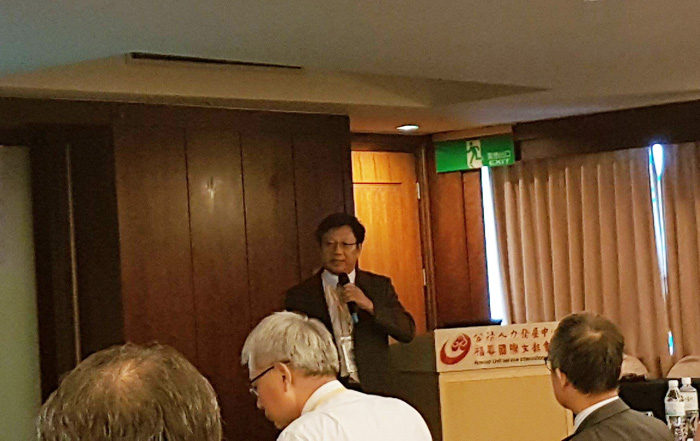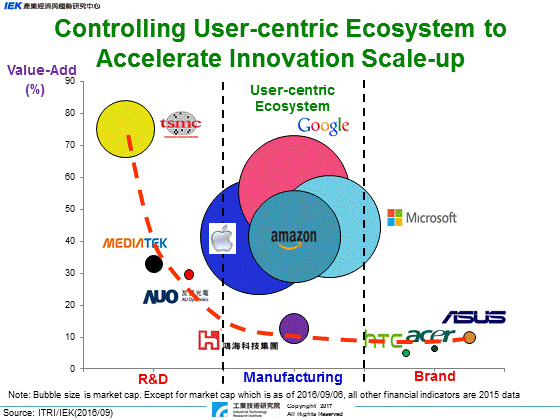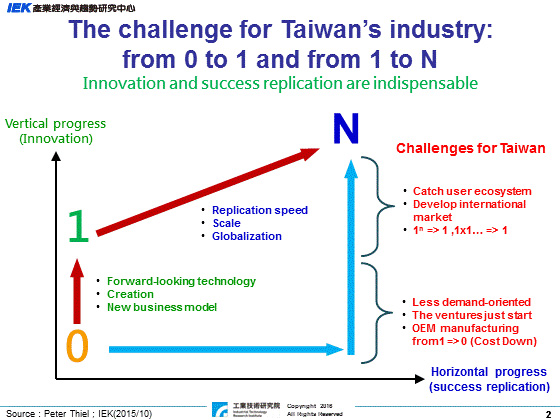|
Taiwan lacks a business model to enable something similar to the innovation relationship between Stanford University and Silicon Valley, according to David Weng, the chief investment officer of the Asia Silicon Valley Development Agency (ASVDA).

Figure 1: David Weng speaking at the Industry and Innovation conference in Taipei; Source: Conor Stuart
He made the comments in response to an audience question at the ‘Industry and Innovation: Policy in the Era of Digitalization’ conference in Taipei, asking him to evaluate innovation readiness in Taiwanese universities. Other discussants at the forum suggested that academia-industry dynamics in which there is a hand-off involved don’t generally work and that a core team or personality must follow an idea from R&D to commercialization for an idea to succeed. Regulations often stand in the way of this happening in Taiwan, in that there are obstacles to professors launching companies.
ASVDA is aimed at optimizing Taiwan’s startup and entrepreneurship ecosystem. It realizes this goal by lobbying for and implementing change in four main areas: capital, talent, regulations and innovation bases. In terms of capital he drew attention to several initiatives, including the Industrial Innovation and Transformation Fund of NT$100 billion (US$3.3 billion), a national investment company which is set to raise NT$10 billion (US$332 million) in an angel investor program, which will raise NT$1 billion (US$33 million), as well as another fund for startups, founded by the Taiwan Stock Exchange, which will raise another NT$270 million. In terms of improving Taiwan’s ability to cultivate, retain and attract talent, he referred to efforts such as the draft foreign talent act, which could be approved as soon as September of this year, the Taiwan Entrepreneur visa, and programs for talent connection with Silicon Valley. In terms of regulations, as well as a general relaxation in laws and regulations, he pointed to efforts to raise funding and encourage venture capital and angel investors to invest in high-risk startups by offering tax concessions and other incentives, as well as the prioritization of regulations allowing for implementation and experimentation with FinTech, and those allowing scholars to engage in business operations. In terms of innovation bases, start-up hubs have been established in Taipei, Taichung and Kaohsiung, and there are plans to construct innovative test beds for AR/VR experience and applications and demonstration AR and VR experiences were also featured at this year’s Taipei Computex.
Taiwanese industries need to work on creating a user-centric ecosystem to expedite innovation scale up, according to Stephen Su, general director of the ITRI Industrial Economics and Knowledge Center (See Figure 2). China has been more successful in this goal than Taiwanese companies and if Alibaba were listed on the figure below it would likely occupy a similar area to Amazon or Google.

Figure 2: User-centric Ecosystem to Accelerate Innovation;
Source: Stephen Su’s presentation (taken from ITRI/IEK)
He traced two distinct models in Taiwan, the first is the so-called “MediaTek” route, pursuing innovation first then scaling up, vs the “TSMC” route, pursuing scale first and then trying to pursue innovation. Both essentially need to move towards user ecosystems and global markets (See Figure 3).

Figure 3: Su stated that companies like MediaTek follow the red arrows and companies like TSMC follow the blue arrows in their trajectory; Source: Stephen Su’s presentation, originally by Peter Thiel, IEK.
He pointed to the five innovation initiatives launched by the Tsai Ing-wen government: smart machinery, Asia Silicon Valley, green energy, national defense and biotech and pharmaceuticals, along with the more recent additions to these proposals, including the circular economy and new agriculture, the digital economy, technology for culture and IC design and semiconductors.
He also outlined the six key strategies of the digital nation strategy (2017-2025)
- Infrastructure for digital innovation
- Talents and skills for innovation
- Digital transformation for industries
- Human rights in open internet and digital society
- Smart cities with public-private sectors
- Digital services and globalization
During the discussion panel segment of the conference, David Maa, general manager of Industry 4.0 Division of the Fair Friend Group, suggested the difficulty different industries have in communicating or cooperating, even in the same country, not to mention across international borders. Professor Hirofumi Aoki, who gave a presentation on how smart technology is being used in elderly care in Japan, stated that companies are often uncomfortable with parting with what they feel is, at times, proprietary information, but that they have to do so to enable this technology to take off.
Eric Anderson, vice president of product creation at Foxconn in Taiwan, stated that the reason that IOT and smart home technology have yet to really take off is the lack of a “fun factor”. The ideas may be good but they’re not sexy enough to create the buzz that mobile phones were able to create. He stated that standard setting can create a platform which will allow these technologies to take off. There is also a trouble in convincing consumers that it’s worth making the change – wearables have not yet gotten to the point where they convince consumers. In terms of IOT and Smart Homes he pointed to the fragmentation of the solutions and the incompatibility of software. He suggested that IOT and Smart home technology should be aiming for applications that are more frequently used or always on and are aimed at self-actualization rather than just survival in order to capture imaginations. He pointed to the examples of Air BNB and Uber in their efforts to make use of existing resources in the city.
 |
|
| Author: |
Conor Stuart |
| Current Post: |
Senior Editor, IP Observer |
| Education: |
MA Taiwanese Literature, National Taiwan University
BA Chinese and Spanish, Leeds University, UK |
| Experience: |
Translator/Editor, Want China Times
Editor, Erenlai Magazine |
|
|
|
| Facebook |
|
Follow the IP Observer on our FB Page |
|
|
|
|
|
|

